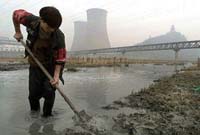China dumps toxic waste in the world's seas
The Amur River is carrying billions of tonnes of polluted water from China

China is causing a serious ecological threat to countries in South-Eastern Asia. The problem was discussed recently in Khabarovsk at a meeting about the Amur River.
There have been 45 serious ecological incidents in the last two months at companies that are situated on the banks of the rivers in China. There was a dangerous explosion at a factory in Jilin, when nearly 100 tonnes of toxic waste was dumped into the Sungari River. The whole world has observed that poisonous liquids are flowing into China. However, nothing has been done about the fact that each year nearly 15 billion tones of everyday and industrial waste is being dumped into the Chinese Sungari River. Experts think that dangerous metals, nitrates, nitrites, phosphates and many other toxic elements are in the polluted water which is allowed to flow freely through the border.
“The polluting of the Amur River is an international problem,” says the Khabarovsk governor Victor Ishaev, “The poisonous water flows into the Amur Estuary, the Gulf of Sakhalin and through the Tartar Strait into the Japanese and Okhotsky Sea. These are the regions where there are the largest naval industries in the world. Much of the toxic waste does not dissolve in the water, but are insoluble oils. The harmful products affect fish and other marine life which then end up in Russia , Japan and Korea .
Ecologists are certain that about 80 percent o the River of China is so polluted that not only is the water unsuitable for drinking but also to be used in industry. The situation in the Amur River became much more serious after the explosion at a factory in Jilin in November 2005. After this disaster there has been one incident after another at Chinese businesses. In their quest for mass industrialization, the Chinese are willing to make sacrifice water quality and conceal the polluting of rivers from the eyes of the world. The Chinese authorities, for example, only informed the Russians about the incident in Jilin eleven days after it had taken place. In the meantime harmful waste had been flowing towards our borders. In the end it turned out that the oil slick stretched for 200km not 50 as the Chinese told us.
“The River Amur has been polluted for a long time, but every year the situation worsens,” says Doctor Lyubov Kondrateva, “Within ten years we will find out the consequences of the toxic waste. Fish, which have a strong smell, will have a higher concentration of trimethylamine, a precursor for cancer. In fish from the Amur River pesticides and nitrites are often found.
Trud
Translated by Michael Simpson
Subscribe to Pravda.Ru Telegram channel, Facebook, RSS!


